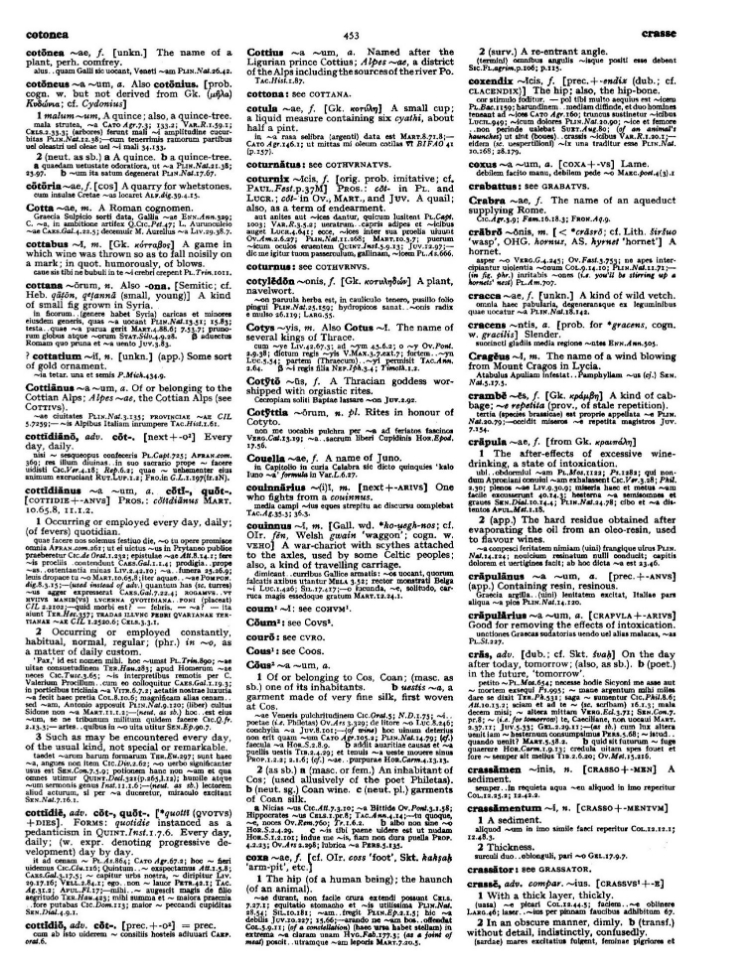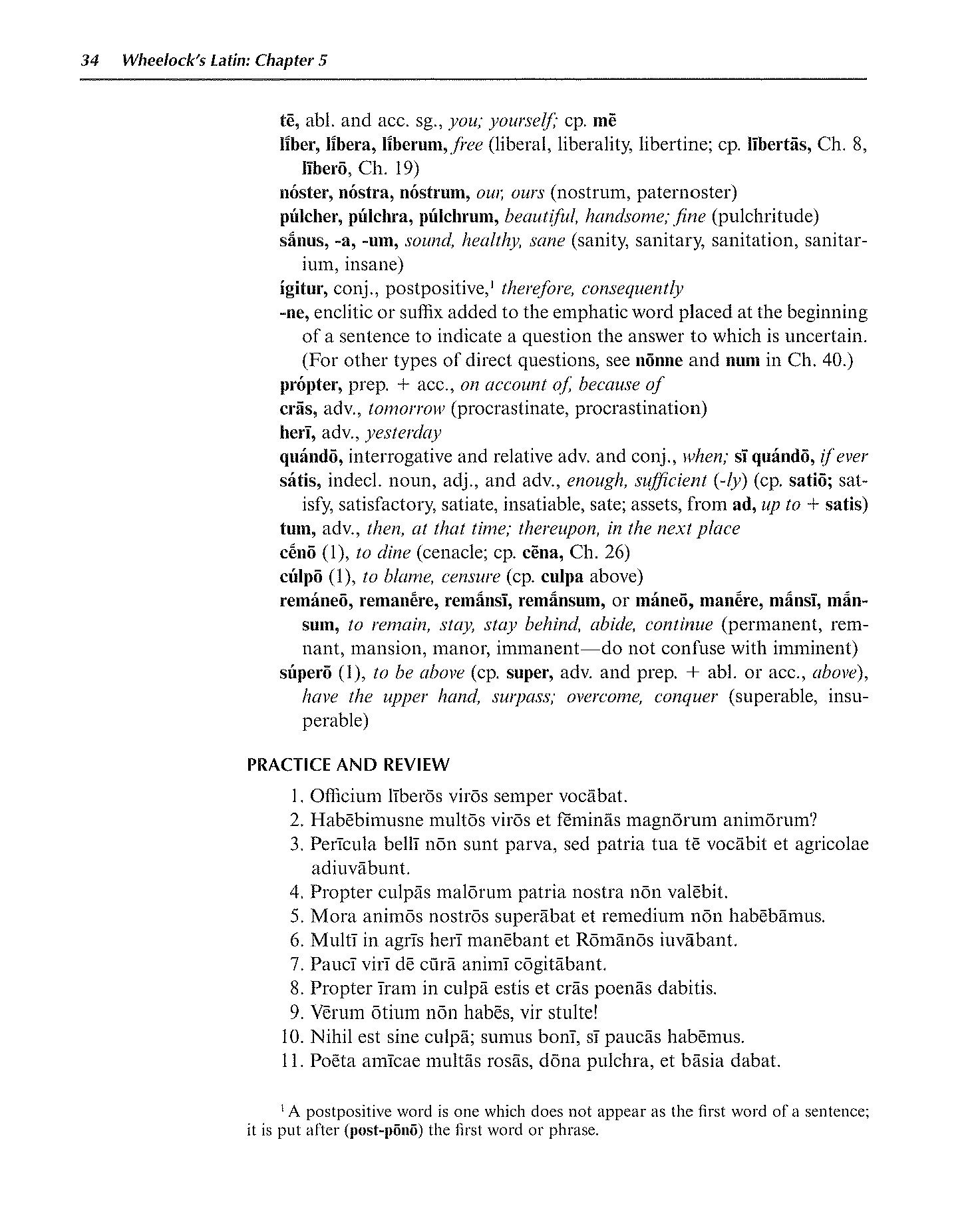
page_listing.tpl
page_subListingDetails.tpl
sub_listingDetails_style1.tpl
sub_listingDetails.title.tpl
crās tomorrow
crās is a Latin Adverb that primarily means tomorrow.
Definitions for crās
Wheelock's Latin
Adverb
- 1
tomorrow
English derivatives:
procastinate procastination
Oxford Latin Dictionary
Adverb
- 1
On the day after today, tomorrow; (also, as sb.). (b) (poet.) in the future, 'tomorrow'.
Sentences with crās
Latin to English
Magister noster mē laudat et tē crās laudābit.Compare Our teacher praises me and he will praise you tomorrow (sg.).
Crās audiet (A) eōs venīre (i.e., crās); (B) eōs vēnisse (e.g., herī); (c) eōs ventūrōs esse (e.g., paucīs diēbus).Compare Tomorrow he will hear (A) that they are coming (i.e., tomorrow); (B) that they came (e.g., yesterday) or that they have come; (C) that they will come (e.g., in a few days).
Cras the victurum, cras dicis, Postume, semper. Dic mihi, cras istud, Postume, quando venit?Compare You'll start to live tomorrow, Postumus, tomorrow, you're always saying. Tell me now, Postumus, when does your tomorrow come?
Iam mala finissem leto, sed credula vitam spes fovet et fore cras semper ait melius.Compare I would by now have ended my sufferings by death, but gullible hope encourages me to live, keeps saying that tomorrow will be better.
Ille potens sui laetusque deget, cui licet in diem dixisse "vixi: cras vel atra nube polum pater occupato vel sole puro; non tamen irritum, quodcumque retro est, efficiet, neque diffinget infectumque reddet, quod fugies semel hora vixit."Compare He will through life be master of himself and a happy man who from day to day can have said, "I have lived: tomorrow the Sire may fill the sky with black clouds or with cloudless sunshine; he will not undo aught that is left behind me, nor change or make as though it had not been aught that the hour, fast as it flies, has once brought."
Data sources
Notes
- Definitions
- Frederick M. Wheelock, Wheelock's Latin, 6th ed., rev. Richard A. LaFleur (New York, NY: HarperCollins Publishers, 2005): 34.
- P. G. W. Glare, Oxford Latin Dictionary, Vols. 1-8 (Oxford: Clarendon Press, 1982): 453.
- Word frequencies
- Paul B. Diederich, The Frequency of Latin Words and Their Endings, PhD diss., (Columbia University, 1939).
Bibliography
Allen, Joseph H. Allen and Greenough's New Latin Grammar for Schools and Colleges: Founded on Comparative Grammar. Edited by James B. Greenough, George L. Kittredge, Albert A. Howard, and Benjamin L. D'Ooge. Boston, MA: Ginn & Company, 1903.
Crystal, David. A Dictionary of Linguistics and Phonetics. 6th ed. Oxford, UK: Blackwell Publishing, 2008.
Delatte, Louis, Suzanne Govaerts, Joseph Denooz, and Etienne Evrard. Dictionnaire fréquentiel et index inverse de la langue latine [Frequency Dictionary and Inverse Index of the Latin Language]. Liège, Belgium: Laboratoire d'analyse statistique des langues anciennes de l'Université de Liège (L.A.S.L.A.), 1981.
Diederich, Paul B. The Frequency of Latin Words and Their Endings. PhD diss., Columbia University, 1939.
Francese, Christopher. "Latin Core Vocabulary." Dickinson College Commentaries. Last modified 2014. http://dcc.dickinson.edu/latin-vocabulary-list.
Gildersleeve, Basil L., and Gonzales Lodge. Gildersleeve's Latin Grammar: Third Edition, Revised, and Enlarged. 3rd ed. London, England: Macmillan and Co., 1903.
Glare, Peter G.W. Oxford Latin Dictionary. Vols. 1-8. Oxford, England: Clarendon Press, 1982.
Krüger, Bernd. "Latin Conjugation Tables." Cactus2000. Accessed May 5, 2023. https://latin.cactus2000.de/index.en.php.
Pierson, Nick. "Sound of Text." Accessed October 26, 2019. https://soundoftext.com.
Wheelock, Frederick M. Wheelock's Latin. 6th ed. Revised by Richard A. LaFleur. New York, NY: HarperCollins Publishers, 2005.
Wiktionary Contributors. "Victionarium." Wikimedia Foundation, Inc. Updated March 18, 2019. https://la.wiktionary.org/wiki/Victionarium:Pagina_prima.
Citation
Chicago (17th ed.)
Allo Contributors. "crās (adv.) - Latin Word Definition." Allo Latin Dictionary. Last modified . Accessed February 19, 2026. http://ancientlanguages.org/latin/dictionary/cras.
Entry created on . Last updated on .







